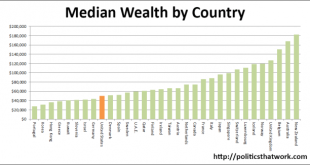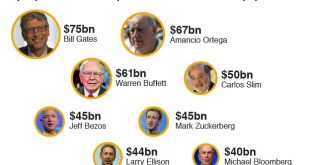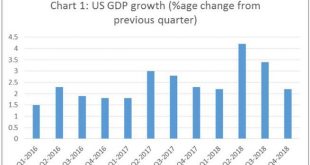conceived by Jason Hickel visualization by Huzaifa Zoomkawala
Read More »Economics vs. the Natural Sciences: The methodology of “as if”
from Michael Hudson What is even more remarkable is the idea that economic assumptions need not have any relationship to reality at all. This attitude is largely responsible for having turned economics into a mock-science, and explains its rather odd use of mathematics. Typical of the modern attitude is the textbook Microeconomics (1964:5) by William Vickery, long-time chairman of Columbia University’s economics department, 1992-93 president of the American Economic Association and winner...
Read More »Fear of Floating
from Asad Zaman Published in Dawn, Mar 27, 2019, a leading Pakistani newspaper, in context of public debate about moving to a floating exchange rate regime — In 1971, when Nixon shocked the world by abandoning the convertibility of dollars to gold, he dragged all of us, unwillingly, into the modern era of floating exchange rates. Since then, economic theories have changed. But old habits die hard; economists and policymakers today continue to think and operate as if they live in the old...
Read More »Median wealth by country
Sources: Credit Suisse (aggregating data from national records) Last updated: May 12, 2016
Read More »Radical uncertainty — a question of economic methodology
from Lars Syll Between 1920 and 1950, a debate took place which defined the future of economics in the second half of the 20th century. On one side were John Maynard Keynes and Frank Knight; on the other, Frank Ramsey and Jimmie Savage. Knight and Keynes believed in the ubiquity of “radical uncertainty”. Not only did we not know what was going to happen, we had a very limited ability to even describe the things that might happen. They distinguished risk, which could be described with the...
Read More »Notes on: power matters
from Peter Radford Let’s start with a different approach: Reality suggests there are many ways in which resources are allocated within an economy, not just one. Economics, as it now exists in its mainstream or standard form, has withered to study just one: that which takes place in markets — where markets are strictly defined in such a way as to guarantee outcomes compatible with a certain ideological perspective. As we have discussed before this trajectory for the discipline was deemed...
Read More »Sweden as a case of MMT
from Lars Syll According to the Swedish government official website, “Historically, the Swedish economy suffered from low growth and high inflation,” which the nation overcame with “inventive and courageous reforms” that “succeeded in maintaining control over public spending. “First, in 1996, a ceiling for public spending was introduced. This was accompanied by the addition of the ‘surplus goal’ … for the government budget.” Swedish government spending reforms were the consequence of a...
Read More »Eight billionaires ‘as rich as world’s poorest half’
Amartya Sen tells Radio 4’s Today that economic inequality must be tackled GETTY IMAGES CALIFORNIA TODAY
Read More »Vanishing green shoots
from C.P. Chandrasekhar and Jayati Ghosh When the third estimate of US growth in the last quarter of 2018 was released the euphoria exuded by forecasters of global growth even a few months earlier waned. The annualised quarter on quarter growth rate that had risen to a more than comfortable 4.2 per cent in the second quarter of 2018, had fallen to 3.4 and 2.2 per cent in the subsequent two quarters (Chart 1). The quarterly rates measuring growth relative to the corresponding quarter in...
Read More »The real debt problem
from Lars Syll The ad nauseam repeated claim that our public debt is excessive and that we have to balance the public budget is nothing but absolute nonsense. The harder politicians — usually on the advice of mainstream establishment economists — try to achieve balanced budgets for the public sector, the less likely they are to succeed in their endeavour. And the more the citizens have to pay for the concomitant austerity policies these wrong-headed politicians and economists recommend as...
Read More » Real-World Economics Review
Real-World Economics Review







